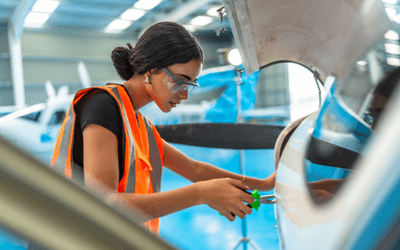The UK may be a small country, but it’s never been short of big ideas. Just look at our history. We’ve repeatedly innovated, invested, and invented to improve the way we work and meet our goals. Long before official recruitment partners existed, employers were looking further afield to find talent that could help make their dreams a reality.
In the first industrial revolution, it was mainly Irish workers (known as ‘navvies’ – short for ‘navigators’) who helped to build our canals and railways. The second industrial revolution, involving the rapid growth of Britain’s factories, also brought in migrant workforces to support. And it was Irish nationals once again who made up a large percentage of the labour responsible for constructing the UK’s major motorways in the 1950s. Fast forward to the more recent evolution of IT and technology and we continue to witness huge shifts in the world of work. Our businesses are online - remote working is not only possible but conventional – and social media and video calls are part of everyday life. Not to mention the technological advances in big data, machinery and equipment that make our workplaces more productive, efficient, and often safer.
But did you know we’re about to see the next big shift in the way we work? It’s time to prepare for the Green Industrial Revolution. But unlike historical developments, this is the first revolution of its kind that has the potential to be truly global. Change is required from first and third-world countries equally, and could result in skills and services levelling out like never before. For recruitment, could this mean a revolution that actually slows skills migration and adds to already challenging skills shortages?
What is the green industrial revolution?
Now a top priority for government and private sector companies alike, the Green Industrial Revolution is set to change the face of how we work for good. The Green Industrial Revolution is designed to slow down and/or reverse global climate change, with the government committing to invest £12bn to create and support up to 250,000 green jobs. They’ve cited that this period of recovery following COVID-19 provides the UK with an opportunity to “build back better and invest in making the UK a global leader in green technologies.”
The government’s ten-point plan includes:
- Advancing offshore wind
- Driving the growth of low-carbon hydrogen
- Delivering new and advanced nuclear power
- Accelerating the shift to zero-emission vehicles
- Green public transport, cycling and walking
- ‘Jet zero’ and green ships
- Greener buildings
- Investing in carbon capture, usage, and storage
- Protecting our natural environment
- Green finance and innovation
The effect of the green industrial revolution on our sectors
But what does the Green Industrial Revolution mean for Carbon60 and our clients?
Immersed in our specialist areas – aerospace & defence; building, construction & infrastructure; manufacturing & technologies; energy & renewables – we’ve been considering the effects the green industrial revolution may have on each.
For aerospace and defence, we’ll likely see the sector looking at improvements in fuel efficiency, energy consumption and the investment and development of alternative non-fossil-based combustion fuels. In building and construction, the spotlight will be on things like insulation improvements and energy efficient heating and cooling systems. Demand for modular construction will almost certainly increase too.
And in manufacturing, we’re expecting to see proactive steps towards waste reduction, automation, and a rise in sustainable materials. But while this latest revolution will undoubtedly alter the future work across all our sectors, it’s energy & renewables that will be affected the most.
The energy sector has been under pressure to reduce its carbon emissions for some time – long before the government’s most recent plans. And in response, many traditional oil and gas companies are now switching their focus to greener, cleaner energy and renewable investments. Where diversifying into more environmental forms of energy generation (such as hydropower, biomass, geothermal, wind and solar energy) simply isn’t viable, businesses are implementing alternative innovative solutions to lower their carbon footprint.
Like other industries, energy giants are streamlining processes and improving efficiencies. But they’re also recycling water and used oil in their operations and are working to reduce methane emissions using the latest tech. Technology is also helping oil and gas specialists to measure and monitor their outputs, providing them with insight for making safer, more sustainable business decisions.
At Carbon60, we have a specific interest in renewables. As well as hydrogen, biomass and energy from waste being a current focus, solar energy is fast becoming increasingly popular in the UK. With household names like Amazon investing heavily in solar energy to power their distribution centres, we’re excited to support our client’s growth in this budding area. As we move into a new era of greener, cleaner working, we’re keen to achieve our own goal of helping to engineer a more sustainable future for us all.
The future of recruitment
In the recruitment world, the knock-on effect will be an increase in greener jobs, particularly those in solar power. With research and development in progress for a solar power plant in space, the possibilities are clearly limitless!
We’re also anticipating a shift in the way people work. Remote and flexible options aren’t going away any time soon; in fact, we envisage them increasing. Where people do travel to work, expect to see a surge in the use of public transport, alongside a decline in business travel. The use of suppliers is also likely to move towards local and/or more ethical, environmentally-sound companies.
It’s these kinds of trends that are currently shaping the ever-evolving world of recruitment. To support our clients, we’re building teams of specialist green recruiters and are using our skills and reach in more traditional engineering markets to identify workforces with skills that can migrate into the emerging green engineering sectors.
Internally, Impellam, our parent company, has already moved to green energy and we’re encouraging our company car drivers to select electric vehicles through salary-sacrifice lease schemes. Are you ready for the Green Industrial Revolution? Changes are coming, and companies need to be prepared. While it may mean some rethinking and adjustment, the outcomes will benefit us, and our planet, long-term.
We’re excited and ready to assist employers as they invest in workforce skills that align with the aims of the Green Industrial Revolution.









